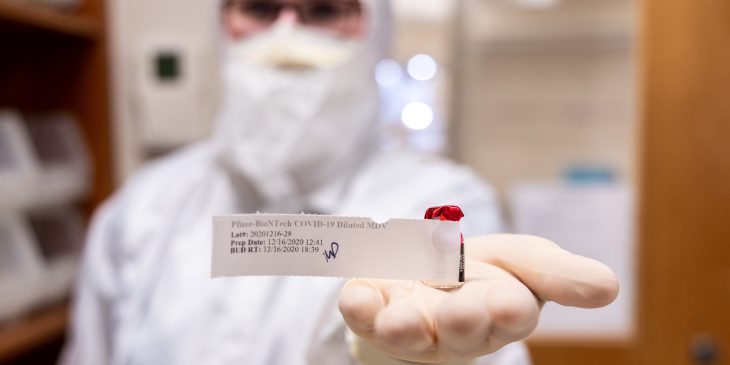While many Americans are excited to finally have access to COVID-19 vaccines, not everyone is sharing in this elation. Now that most Americans are eligible to receive a vaccination, it has become apparent that vaccine hesitancy is widespread.

Dr. Tracey Conti
Debates over whether people should get vaccinated divide the country — and on a smaller scale, divide friendships and relationships.
“It’s a mixed picture,” explained Dr. Tracey Conti, executive vice chair of the Department of Family Medicine at UPMC. “People who have had loved ones suffer from the virus are grateful for the vaccine, but many younger people who may not be at risk, and have been exposed to myths, might not see the importance.”
Myths that vaccines are unsafe due to rushed development, that they will affect women’s fertility and that mRNA vaccines change the body’s DNA are not backed by evidence.
“We need to have transparent and honest conversations and discuss the truth, but we are not going to win over everyone,” said Conti, who is also the primary care lead for UPMC’s Health Disparities Workgroup. “We won’t see 100% vaccination, and I don’t think that’s the goal. This is about preventing serious illness and death. We know this vaccination saves lives, and that’s the message we need to reiterate.”

Dr. Joy Gero
If you have a loved one who is hesitant about getting vaccinated, there are a few key conversation tactics that might help keep the discussion on track and productive, according to Dr. Joy Gero, program director of the general adult and behavioral health Intensive Care Unit at UPMC Western Psychiatric Hospital.
Gero suggests framing the conversation around personal experiences rather than leading with facts, which can cause the person to become more defensive:
• Affirm a person’s fears and acknowledge their concerns.
• Bridge the discussion with a fact or statistic about the vaccines.
• Convince the other person to see your perspective through a personal story that explains your point of view.
Like much of the COVID-19 pandemic, political beliefs also play a role in peoples’ decisions about the vaccinations.
“The pandemic has been politicized in a way that makes it more difficult to reach our loved ones who are vaccine hesitant. This has made many people believe that the decision for or against vaccination is connected to our values, and so any argument to persuade a person may also make them feel attacked,” said Gero. “It’s important to start by validating a person’s concern and experience. Don’t say things that create shame or feel adversarial. Shaming our loved ones is not going to help them get vaccinated.”
Gero also notes that these conversations should primarily happen between people with close relationships, as it is not effective to make emotional appeals to strangers or people you do not regularly speak to.
“A lot of the work is planting seeds for our family, friends and loved ones to eventually feel a different way. We can’t expect a result at the end of the conversation. This is about having impact over time,” said Gero.
To schedule a COVID-19 vaccine through UPMC, visit Vaccine.UPMC.com, or www.UPMC.com/coronavirus/covid-vaccine/faq for answers to COVID-19 vaccine questions.









